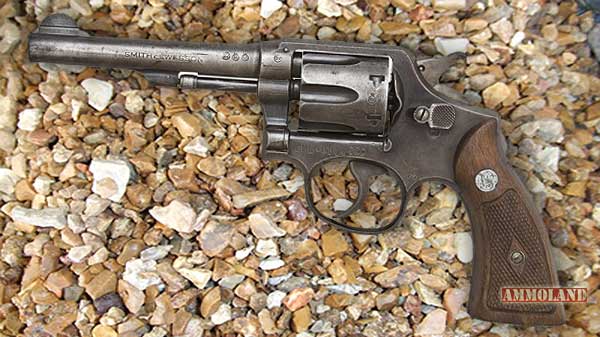Smith & Wesson Victory Model Revolver
Gun Collecting
By Peter Peter Suciu


Michigan –-(Ammoland.com)- The Smith & Wesson Model 10 has been called the most successful handgun of all time, and the most popular center-fire revolver of the 20th Century. (See: The History of Smith & Wesson Firearms by Dean K. Boorman).
The Model 10 is a .38-caliber six-shot pistol that first went into production in 1899, known as the .38 Hand Ejector model. The Model 10 is a rugged design yet easy to mass produce. Over 6 million have been manufactured to date.
At the start of WWII, the United States was woefully unprepared for a second world wide conflict. The official handgun of the military at the time was the Colt .45-caliber M1911 and its variants. While this handgun has more stopping power than the Model 10, the M1911 was more difficult to produce so the military purchased over 250,000 Model 10’s. The Smith & Wesson .38’s produced between 1940 and 1945 had serial numbers with a V prefix and were designated as the Victory Model.
Navy and Marine aviators carried the Victory Model as a side arm. The lighter and more compact design made a good fit with for the tight spaces pilots and crew members found inside airplanes of the day. The U.S. Coast Guard used the Victory Model well into the 1990’s. The Victory Model was also used by security officers who guarded factories and defense installations throughout the United States during the war.
To supplement the need for .38’s, the military turned to Colt, and the Colt Commando was born. Like the Victory Model, the Commando was a conventional double action revolver with a parkerized finish and chambered for the .38 Special cartridge. Most had a 4” barrel length, but a few were produced with a 2” barrel and came to be known as Junior Commandos. Colt sold over 45,000 Commando’s before war’s end.
Collectors will find that identifying a Victory Model is simple. The serial number on the butt has a V prefix. The Victory Model serial numbers were a continuation of the numbers used on the S&W .38 revolvers made for the British government prior to the U.S.’s entry into WWII. The U.S. Victory Model was introduced at serial number V-40,000.
After serial number 769,000, the V prefix was changed to VS to indicate these revolvers were fitted with an improved hammer block to help prevent accidental discharges if the gun was dropped. This change was made after the death of a sailor from an accidental discharge of a Victory pistol dropped on the deck of a ship. By the time the war stopped, serial numbers had reached VS-850,000.
The Victory Model was finished in Parkerizing and had plain walnut grips, and a lanyard loop on the butt. Victory Model revolvers generally had their top-straps stamped with an ordnance flaming bomb insignia and several types of markings may be observed. The most commonly encountered are “United States Property”, “Property of the U.S. Navy” markings and “U.S. Property GHD”. Some have been reported with “USMC”, “USCG” and “Property of U.S. Navy” stamped on the side-plates.
A few Victory Model revolvers with 2” barrels were produced. Most of the short barrel Victory Model revolvers don’t have the typical martial markings with the exception of the flaming bomb stamped on the butt.
The S&W Victory Model wasn’t a frontline sidearm. The low velocity .38 special cartridge couldn’t compete with the kinetic energy produced from a standard .45. But it did fulfill its duty well as a sidearm for those who didn’t fight in the infantry frontlines. Any WWII firearms collection would be proud to have a Victory Model alongside the better known weapons of that era.
Peter Suciu is executive editor of FirearmsTruth.com, a website that tracks and monitors media bias against guns and our Second Amendment rights. Visit: FirearmsTruth.com
